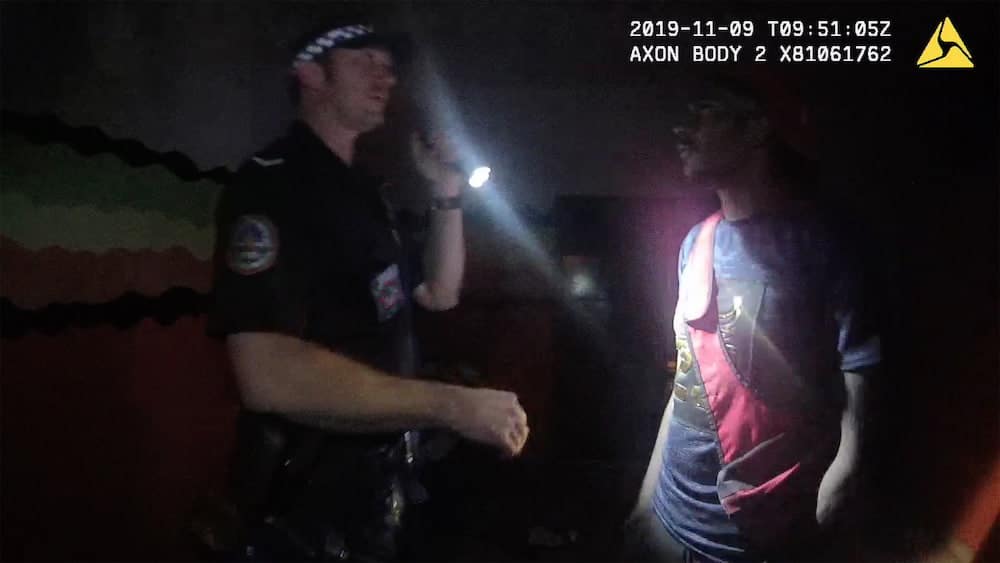The police officer with Constable Zachary Rolfe when Kumanjayi Walker was fatally shot did not consider the Aboriginal teenager dangerous, a jury has been told.
Rolfe has pleaded not guilty to murdering the 19-year-old during a failed arrest attempt in Yuendumu, 290km northwest of Alice Springs, on November 9, 2019.
He shot Mr Walker three times and says he was doing his job and defending himself from a violent offender who had stabbed him in the shoulder with a pair of scissors.
Sergeant Adam Eberl told the Northern Territory Supreme Court on Tuesday he did not think Mr Walker was a threat to him or Rolfe as the teen walked towards them.
Sgt Eberl and Rolfe had watched body-worn camera footage of Mr Walker violently threatening two other officers in Yuendumu with an axe six days earlier.
The incident had contributed to the decision to send Sgt Eberl, then a constable, and Rolfe to the community but he said he did not notice if Mr Walker had his hands in his pockets as he approached the men.
“When I was there no, not until watching the body-worn after,” he said.
Sgt Eberl also said he did not think to ask Mr Walker to show his hands to the officers as he moved closer or believe he would need to “gain control” of the teen.
Body-worn camera footage shows Mr Walker telling the officers his name is Bernard Dixon before one of them orders him to put his hands behind his back in order to arrest him.
He does not do it and seconds later the men begin scuffling. Mr Walker then stabs Rolfe in the shoulder with scissors held in his right hand before three shots are fired.
The second one was fatal.
Prosecutors have conceded the first shot, which was fired while Mr Walker was standing and resisting arrest, was justified.
But they say the second and third shots went “too far” because the teen was “effectively restrained” on the ground by another officer when Rolfe pulled the trigger.
Sgt Eberl also said he was not given an order before the shooting to arrest Mr Walker at 5.30am the following morning, when he was likely to be sleeping and more easily taken into custody.
Earlier on Tuesday pathologist Marianne Tiemensma, who performed an autopsy on Mr Walker’s body three days after he died, told the court that the teen had no scissor injuries on his hands and they were likely to have been closed when he stabbed Rolfe.
Asked whether the “small and blunt scissors” could have killed Rolfe or his fellow officer, Dr Tiemensma said it was unlikely.
“I do not think he would have been able to generate enough force to overcome all of the resistance and go into the skin and soft tissue and structures of importance to cause significant injury,” she said.
Dr Tiemensma said she had watched body-worn camera footage of the shooting incident and Const Eberl had control of Mr Walker within seconds.
“From the moment the scissors are withdrawn from his right pocket … In less than three seconds he is far too restrained by Eberl who is moving in from behind Kumanjayi’s back, grabbing him around the shoulder and neck, so that was very fast,” she said.
“I don’t think these scissors could have caused fatal injury. Fatal stab wounds by scissors are not common.”
Dr Tiemensma also found that Rolfe’s first shot into the right side of the teen’s back would not have killed him, as it did not damage vascular structures or result in excessive bleeding.
She said Mr Walker had a very low blood alcohol level the night he died and an insignificant amount of cannabis in his system.
The trial continues Wednesday.
Get all the latest Canberra news, sport, entertainment, lifestyle, competitions and more delivered straight to your inbox with the Canberra Daily Daily Newsletter. Sign up here.



